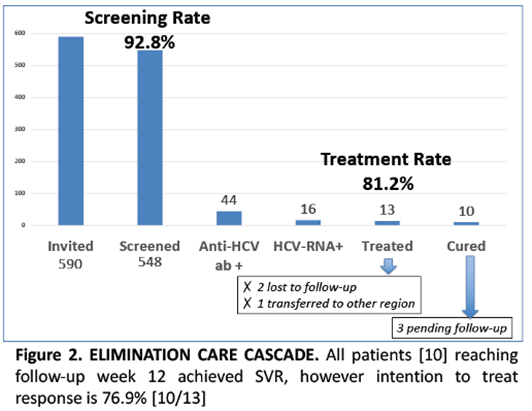HONEST: Micro-elimination beyond prison walls
The HONEST micro-elimination project was a test and treat strategy to end viral hepatitis C (HCV) among people serving non-custodial sentences and visiting the Jose Hierro Social Integration Center (SIC) as part of their sentence. With point-of-care testing, the support of telemedicine and of a ‘Navigator’ overseeing care delivery, HONEST linked this population to screening and treatment for HCV for the first time.
Who?
A collaboration between the Jose Hierro SIC and the Marques de Valdecilla University Hospital.
Why?
In Spain, there are twice as many people serving non-custodial sentences as there are prison inmates. This cohort has an HCV prevalence ten times higher than the general population. Whereas they are as vulnerable to HCV as those who are incarcerated (i.e., they share similar drug use habits and often spend time in prison due to sentence infractions), they are systematically under-represented in micro-elimination strategies for HCV. This is partly because they are harder to reach than the those in prison and have a high proportion of mental disorders and severe psychiatric conditions.
People serving non-custodial sentences are required to check-in at one of the 32 SICs in Spain at the beginning of their sentence. During the check-in they are offered a voluntary health evaluation by the resident medical staff to try and link them to care.
How?
For the HONEST project, the medical staff at the Jose Hierro SIC introduced rapid point-of-care testing for HCV as part of the voluntary health evaluation. On the same day, cases with detectable viral load were evaluated by staff at the Marques de Valdecilla University Hospital, and treatment was prescribed at tele-consultations involving the patient and the resident medical staff. Patients subsequently initiated treatment at the Marques de Valdecilla University Hospital with the support of a Navigator in charge of ensuring treatment adherence and monitoring new or re-infections every six months. To improve the enrollment in this model of care, lunch and travel tickets were provided to the participants. Also, in accordance with the Spanish regulation, the time spent receiving healthcare can be deducted from the individual’s sentence.

Outcomes
Between June 2019 and June 2021, 548 out of 590 individuals checking in at the Jose Hierro SIC agreed to participate and were screened for HCV (a 98.2% acceptance rate). Most were male (86.5%), unemployed (48.9%) and with a median age of 38 years. Up to 48% (264 out of 548) had drug dependency, including both legal and illicit drug consumption. Drug use was higher in the cohort actively infected with HCV: HCV antibodies were present in 8% (44 out of 548), 2.9% (16) had detectable HCV-RNA, and only 7% knew their HCV serological status. All patients with detectable HCV-RNA were prescribed treatment except for one in treatment for HIV who was soon later transferred to another region. Two patients did not show up to take the treatment after prescription and were lost to follow-up. This resulted in a treatment rate of 81.2%.
Learnings / Recommendations
The population serving non-custodial sentences is a challenging group with a high prevalence of HCV infection. Micro-elimination programmes like HONEST, using point-of-care rapid testing, telemedicine and a Navigator figure, are necessary to eradicate HCV among these vulnerable and hard-to-reach populations. At the same time, consideration should be paid to the decentralization of HCV treatment delivery outside the hospital setting to improve treatment adherence.
FUNDING
Private funding.
Contact
Dr Javier Crespo
javiercrespo1991@gmail.com